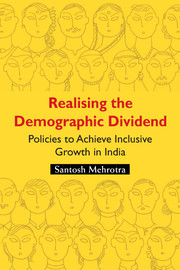Book contents
- Frontmatter
- Contents
- List of Tables and Figures
- Preface
- Acknowledgements
- Part 1 Growth, Employment and Inclusion
- Part 2 Human Capital Formation
- Chapter 8 Addressing Capability Deprivation of Women for Inclusive Growth
- Chapter 9 From the Right to Education to the Right to Learning
- Chapter 10 Food Security, Nutrition and Health: Policy Dilemmas and Interlinked Challenges
- Chapter 11 Redesigning Sanitation Programmes to Make India Free from Open Defaecation
- Part 3 Building a System of Social Protection
- Part 4 Governance
- Index
Chapter 10 - Food Security, Nutrition and Health: Policy Dilemmas and Interlinked Challenges
from Part 2 - Human Capital Formation
Published online by Cambridge University Press: 05 June 2016
- Frontmatter
- Contents
- List of Tables and Figures
- Preface
- Acknowledgements
- Part 1 Growth, Employment and Inclusion
- Part 2 Human Capital Formation
- Chapter 8 Addressing Capability Deprivation of Women for Inclusive Growth
- Chapter 9 From the Right to Education to the Right to Learning
- Chapter 10 Food Security, Nutrition and Health: Policy Dilemmas and Interlinked Challenges
- Chapter 11 Redesigning Sanitation Programmes to Make India Free from Open Defaecation
- Part 3 Building a System of Social Protection
- Part 4 Governance
- Index
Summary
A development process usually involves synergies between interventions. There are two synergies present (as we discussed in chapter 1). One synergy of outcomes plays out at the macro level among income-poverty reduction, human capital development (or human functioning at the aggregate level), and economic growth. The other synergy of outcomes, at the micro or individual level, occurs as basic social service provision leads to improved human functioning at aggregate societal level. These two are linked by the mutually reinforcing interaction among good health, nutrition, and education, which are both ends in themselves, but also means to other ends at a macro-societal level, and hence common to both sets of synergies. It is the second synergy that is one focus of this chapter, especially as it relates to nutritional outcomes. Child malnutrition is among the most serious obstacles to attaining and maintaining health in later life.
India has one of the highest levels of child and hence adult malnutrition in the world. It is not known to non-specialists that the damage to child health and mental development that sets in between ages 0 to 2 is irreversible, and damages the health and nutrition status of the person for life, as well as her learning ability.
When poor nutrition starts in-utero, it extends throughout the life cycle, particularly in girls and women. This not only amplifies the risks to the individual's health but also increases the likelihood of damage to future generations, through further foetal retardation. Poor nutrition of the mother during pregnancy leads to low birth weight of the baby. Low birth weight increases the risk of infant and child mortality and those infants who survive are usually undernourished, fall ill frequently, and fail to develop optimally, both physically and mentally. Further, undernourished adults are functionally impaired and unable to sustain productive physical activity throughout the day. The lack of nutritional requirements leads to sluggish recovery from an illness. Malnutrition can also be linked to the growing HIV/AIDS pandemic as malnutrition makes adults more susceptible to the virus.
- Type
- Chapter
- Information
- Realising the Demographic DividendPolicies to Achieve Inclusive Growth in India, pp. 283 - 306Publisher: Cambridge University PressPrint publication year: 2015



